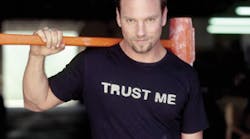Unscripted and completely real, "Monster House" shows electricians and contractors what a real deadline is
It's been months since Merle Rogers helped to completely remodel a San Fernando Valley, Calif., home in less than a week, and he's still tired. “I was working 14, 16, even 18 hours a day,” he says. “In other words, ‘How long can you stand up?’” To make matters worse, he didn't even get paid for the job. Instead, he took home a couple thousand dollars' worth of power tools and had his experience taped for TV. Rogers, who teaches electrical construction and maintenance at Los Angeles Trade Tech College is one of nearly 100 contractors and electricians who have appeared on the Discovery Channel's “Monster House,” cable TV's latest foray into home renovation reality programming.
“Trading Spaces” it ain't. Hosted by L.A. comedian and onetime construction foreman Steve Watson, the weekly show goes beyond redecorating one room of a house while the owners are away to radically rebuilding entire sections of a home in a theme that reflects — and often times tests — the occupants' tastes. And it all has to be done in a week. The rebuilds have ranged from a medieval castle-themed abode with a kitchen table that lowered from the wall like a drawbridge to a “Saturday Night Fever”-inspired home complete with a working disco floor. These renovations aren't designed for homeowners who want to increase the resale value of their homes. They're for the fanatics who want to eat, sleep, and live in their fantasies.
Each week, Watson is joined by five new builders — chosen from the hundreds of applications and audition tapes sent to the show's producers — who learn when they arrive on-site Monday morning what projects they have to complete by midnight Friday if they want to collect their $3,000 prize packages of Makita power tools and ESAB welding equipment. In case you don't have a calculator handy, that gives them 120 hours to do what might take a construction team weeks to finish in the real world.
And that's where the drama — and the challenge — come in. Take five tradesmen who've never met before, add one irreverently brash but completely capable foreman, put them in the pressure cooker of a TV show for five days, and you're bound to end up with some conflict. Although it's natural to assume the producers edit the show in order to play up the tension — and therefore increase the watchability — Series Producer Jeff Kuntz says the home viewers are getting the straight story. “It isn't our intent to manipulate or orchestrate any sort of drama that isn't there,” he says. “By virtue of having five guys who have never met before do a lot of work in a little bit of time, it just happens.”
It may be TV, but Watson says the best way to get things done is to leave your ego in the truck. “It's good to have people who are natural leaders, but you also need people who can follow and work well together,” Watson says of his weekly charges. “Otherwise, there's just no way to get this kind of stuff done. I remind them all the time that this is television and you don't want to look bad on TV. You don't want to be that guy.”
Those tool belts aren't props.
“Sure it sounds hard, but this is TV,” you say. “Those builders must have help along the way, and everything works out in the end because it's all scripted anyway.” Not a chance. Although the week-long build must be edited down to fit into the hour allotted for the show, everything that makes it on air really happened. And if the last switch is wired as the clock strikes midnight on Friday, it's because that's the way it happened. “The bottom line is this stuff is very real,” Kuntz says.
The only team member who doubted the reality of the show was asked to leave when he revealed that he had lied about his qualifications because he thought he'd get a hand from behind-the-scenes builders when the cameras weren't rolling. He was, coincidentally, an electrician — sort of. “I realized by about the third day that this guy couldn't wire a light switch,” Watson says. “I pulled him aside and he said, ‘Well, I thought we were just here to make a good TV show.’ Sometimes people slip through the cracks, just like with any job.”
For Watson, part of selling the reality aspect of the show is proving to each team that he knows his way around a construction site. He used to spend his nights telling jokes, but he also grew up around an uncle who was a builder, and he headed up his own construction business in L.A. to make ends meet before landing the Monster House gig. Showing up on-site every day wearing a new T-shirt emblazoned with phrases like “Role Model” and “Everyone is Entitled to My Opinion” — a short-sleeved, revolving sign of sorts that seems to finish the sentence, “Today Steve's mood is…” — Watson works just as hard as his team to prove that he's earned the right to be there. He's been known to work 80- and even 90-hour weeks. “As soon as people hear that I'm a comedian and an actor, there are those who are going to say, ‘Well, what does this guy know?’” he says. “But I can't make everyone understand what my background is.”
Kuntz says Watson is the real deal. “He's there with us in the morning, and he leaves late at night, and come Friday morning, he's just as exhausted as [the builders] are,” he says. “He's taken on his responsibilities as a host and come up to speed with what our objective is as a TV show, and he goes on camera and sells it and represents himself to five new builders every week. I find that enviable.”
Watson's selling himself to his teams as well. He doesn't mince words and he's not afraid to get in your face if you aren't pulling your weight, but he's won over most of the builders. “I'll admit, at first I thought he was a little cocky,” says Joe Pawluk, a licensed electrician who appeared on the show. “But once I accepted the fact that he's the guy in control, I realized he was a gem.”
And just as with every construction project, building codes, including the NEC, must be met. The show does hire the local deputy inspector for the California city in which the week's build is taking place to oversee the team's progress, but at the end of the week, the build is subject to the same type of inspection that any non-televised construction project receives, and then some.
“We are scrutinized more than most private companies, just because we're on TV,” Watson says. “They do a final inspection on Monday, and if something isn't up to par, they'll let me know and we'll correct it.”
Rogers, who wired the electrical system for the Old English-themed house, and Pawluk, who worked on the Jetsons-meets-the-21st-century retro-future house, learned the first day on-site that their responsibilities were every bit as real as in any private construction job. For Rogers, that meant rewiring several portions of the existing electrical system before he could even start on his scheduled projects for the show. “As soon as I started working on it, I opened up the walls and all of the electrical was just snarled — wrong, illegal, crappy stuff,” he says. “First I had to unscrew-up the screw-ups.”
Although Pawluk didn't run into any hidden Code violations, he still had his hands full. Saddled with installing a hardwired video intercom system that required running 0.5-in. and 0.75-in. conduit throughout several rooms of the house and picking up the slack when one of the other builders couldn't finish a remote-controlled fireplace door that involved several motors, relays, and limit switches, he found himself working up until time ran out. But he blames that partly on his own time management skills. “People are procrastinators by nature,” he says. “You get into the groove and you cruise along thinking everything is cool, but what you really need to do is jump on it right out of the gate.”
Other electricians are watching.
The risk in signing up for any reality TV show is that no matter how well you think you performed, the cameras could tell a completely different story. And then again, if you look like a fool, the cameras don't need to stretch the truth. “We tell these guys that if they want to come to the table with a little swagger, if they want to bring it, they can bring it,” Kuntz says. “But they need to be prepared because we're going to show it the way it is. And if they're going to struggle, we're going to see them struggle.”
Rogers failed to recognize that fact before showing up the first day of his build, but the realization that his performance on the show could affect his reputation dawned on him soon thereafter. And despite the pressure of having to finish the job in such a short period of time, he wasn't about to give the producers any reason to paint him in a negative light by cutting corners. “I've got to be an example to my students,” he says. “Getting caught doing something stupid or illegal just wouldn't be acceptable. That would be worse than losing the prizes by a long shot.”
In fact, he even took advantage of the opportunity to teach his students something about workplace safety. “I wore my hard hat,” Rogers says. “And I hate wearing my hard hat just as much as anyone else.”
Pawluk, on the other hand, wasn't nervous about how he might be portrayed after the show was edited — he was more concerned with just not doing anything stupid. (“I'm satisfied,” he says. “I came across as a low-key, get-it-done kind of guy.”) In fact, he not only didn't do anything stupid, he has since parlayed his stint on the show into a recurring behind-the-scenes roll on the show for his Homebodies General & Electrical Contractors outfit. For the past several episodes, his crew has been responsible for overseeing the installation and safety of the temporary power required for the show. “We all agreed we wanted to put safeguards in place to make sure the workers are protected,” he says.
Watson and the Monster House crew have finished filming the first 18 episodes the Discovery Channel ordered, so he's ready to enjoy a little time off. But with rumors circling the jobsite that they'll be doing the show through at least 2006, he's not counting on having much down time in the future, which, ironically, is affecting his ability to be a handyman around home. “My wife asked me to wire up a ceiling fan the other day, and I had to call someone,” he says. “With my schedule, the last thing I want to do is work on my own house now. I just don't have the time or energy anymore.”
Sidebar: Now Casting: Monster Electricians
Despite the popularity and success of “Monster House,” Jeff Kuntz, series producer, had a little trouble when recently trying to recruit builders for two shows taped in Las Vegas. “It seems that most of the qualified skilled people in Las Vegas are working,” he says. “A lot of the people are union workers who are committed to work, and they're probably less inclined to get out of what they're doing to do a TV project.”
Although they've put the wraps on the season, the Monster House team and its production company, Original Productions, are still looking for a few good electricians. And even though the majority of the electricians and contractors they hire are based out of Los Angeles, Kuntz says he's more than willing to go out of town to find talent. “I really enjoy the out-of-town casting,” he says. “If we can do it, I like to because it puts a mix into the crowd, and you get a mindset or an intellect that you won't necessarily always find in L.A.”
So if you're willing to put your reputation on the line in the name of television, fill out the application (www.origprod.com/monstercon.html) and send it in. But be prepared to compete for the job. “We get hundreds of applications,” Kuntz says. “So to stand out, you have to be not only a craftsman, but a skilled artisan as well.”





